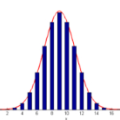Score-based generative models (SGMs) synthesize new data samples from Gaussian white noise by running a time-reversed Stochastic Differential Equation (SDE) whose drift coefficient depends on some probabilistic score. The discretization of such SDEs typically requires a large number of time steps and hence a high computational cost. This is because of ill-conditioning properties of the score that we analyze mathematically. We show that SGMs can be considerably accelerated, by factorizing the data distribution into a product of conditional probabilities of wavelet coefficients across scales. The resulting Wavelet Score-based Generative Model (WSGM) synthesizes wavelet coefficients with the same number of time steps at all scales, and its time complexity therefore grows linearly with the image size. This is proved mathematically over Gaussian distributions, and shown numerically over physical processes at phase transition and natural image datasets.
翻译:基于分数的基因化模型(SGMs)通过运行一个有时间反转的慢速分等系数(SDE),综合高森白色噪音的新数据样本,其漂移系数取决于某种概率分数。这种SDE的分离通常需要大量的时间步骤,因此计算成本很高。这是因为我们数学分析的分数的调制性能不佳。我们显示,SGMs可以大大加速,将数据分布纳入一个条件性的波子系数跨尺度概率的产物。由此产生的波列计分率模型(WSGM)将波子系数与所有尺度的相同数量的时间步骤合成,因此其时间复杂性随着图像大小的线性增长。这在数学上被证明超过高斯分布,并显示在阶段过渡时的物理过程和自然图像数据集中的数字。




